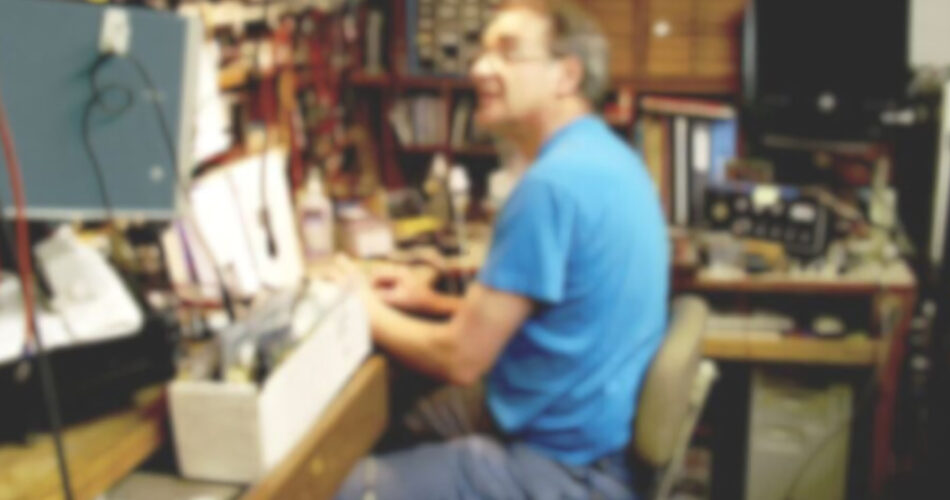Halfway up the staircase, hidden in the shadows, I crouched quietly and allowed a few moments to pass into the darkness. I had clumsily shifted my weight on the previous step, sending an audible crack echoing into the silence. I might have given myself away, but maybe if enough time went by, the inconvenient sound would be disregarded as the cat slinking around, or the house settling. I couldn’t continue until the coast was clear.
I was making my way upstairs to Dad’s shop, where, in the evenings, he could be found working on one of his projects—studying an electronics schematic, working on a radio, or every now and then, gluing together some knick-knack of Mom’s that one of the kids had busted earlier in the day. Always engrossed in his work, it was a fun challenge to sneak up on and surprise him. But it was never easy.
The wooden stairs were uncarpeted and creaky, and the hall that led to the shop provided minimal cover where I could hide and strategize my next steps. It took a certain amount of well-practiced talent to sneak up on Dad, but I had been doing it for years. I knew all the tricks. I took advantage of the times I could hide my movements beneath other sounds, like the bouncing melody of Buddy Holly’s Peggy Sue, or Mom’s deliberate footsteps when she delivered Dad a glass of pop. But tonight I wasn’t so lucky. The whole house was quiet.
I crouched at the top of the steps and slowly leaned around the banister, holding my breath. Looking down the hall, I tried to gauge where Dad would be in his shop, but I couldn’t see anything past all of the equipment he had stacked up on tables in the center of the room. I had to carefully consider my next move. As I debated, I smelled the familiar burning of solder wafting my way. Tonight was a radio repair night. He’d be sitting in the left-hand corner of the room below the bright lights shining down on his workbench.
With renewed confidence, I stepped quietly around the bannister and into the hallway that led to the shop. There were no hiding spaces in this twelve-foot span of cool, maroon- and green-marbled tiles, but that didn’t intimidate me. I was small and light-footed, and could cross the expanse silently until I reached the safe zone just outside the shop door.
I could hear Dad singing under his breath—the light, wispy, almost-whistle that he often used unintentionally while focused on a task. Peeking around the door frame, I saw him sitting just where I predicted. Resting on the tip of his nose were his brown-rimmed glasses, the ones he only wore when working with something small, like the components of a circuit board. He hadn’t noticed me.
In the next phase, I would expertly position myself under cover of the table in the middle of the shop. Keeping close eye on Dad’s movements, I got on my hands and knees and inched across the floor. Here, I had to be especially careful where the tile turned to wood. Causing an accidental creak now would mean the end of my mission. Once safely behind the table—still unseen and unheard—I peered around the table leg, preparing to jump out and surprise him.
“Well, hello there Kristina.” Dad looked over and smiled.
Game over! “How did you know I was here?” I was shocked. There was no way! I was too careful to be noticed.
“I saw you in my peripheral vision,” he said. He turned his attention back to his soldering. I rose from the floor and stood beside his workbench.
“What is peripheral vision?” I asked. I watched as he brought solder and iron together to make a small pool of liquid silver on the circuit board.
“It’s seeing out of the corner of your eye,” he said. “Even though I was looking here,” he pointed to his workbench, “I could see out of the corner of my eye a shape coming into the room.”
I was amazed. Peripheral vision? I never knew there was such a thing.
Dad looked up again and grinned. “I also heard the floor creak.”
